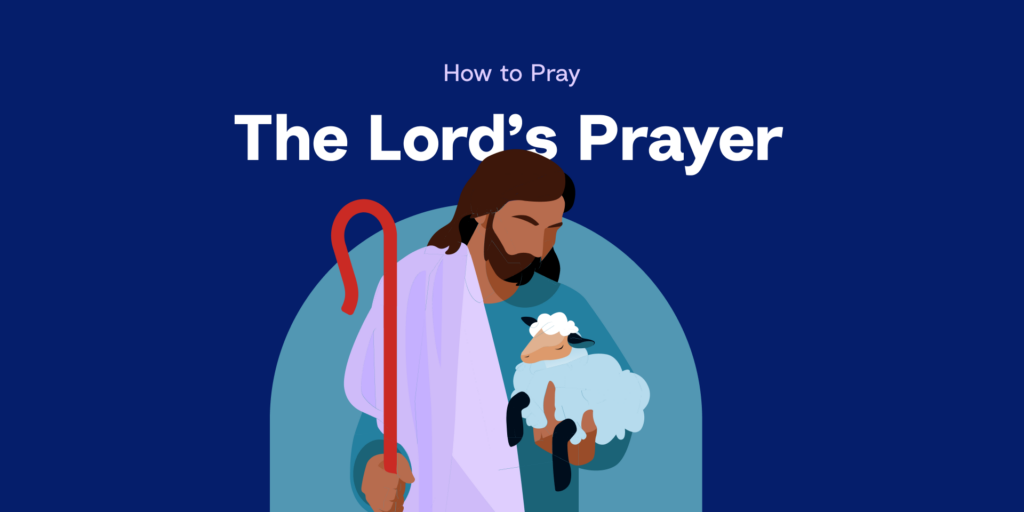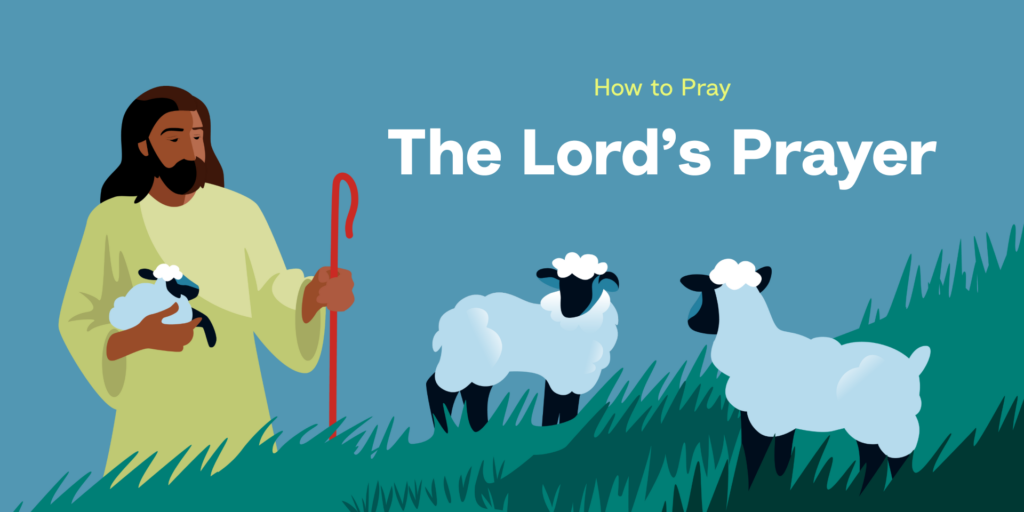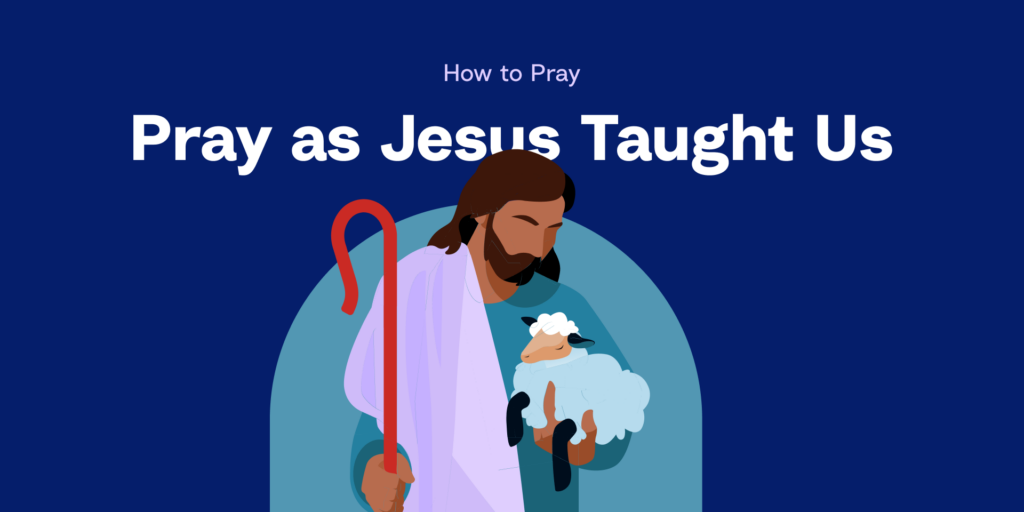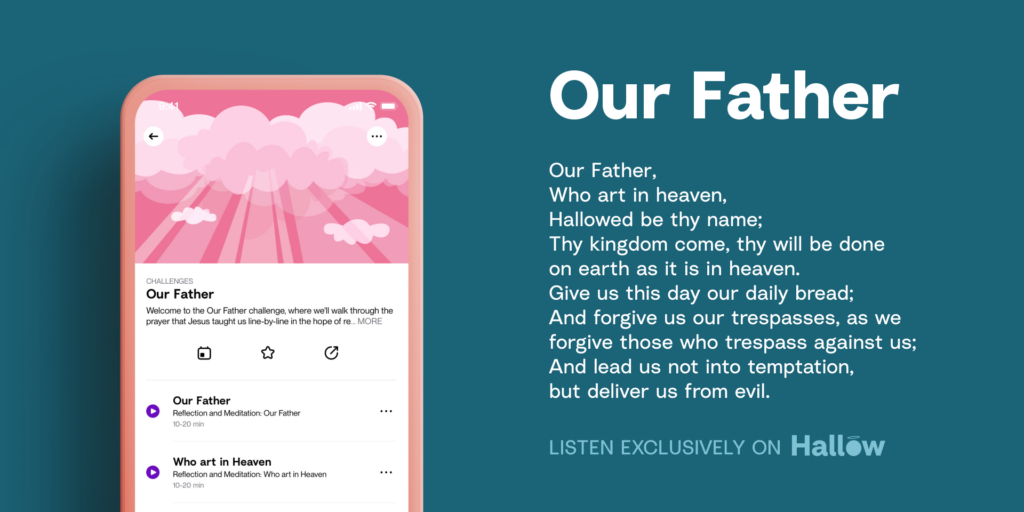Let us not forget the great prayer: the one that Jesus taught us, and which is the prayer with which he prayed to the Father. This prayer prepares us for Communion.
Pope Francis, General Audience — March 14, 2018
The Lord’s Prayer, also known as the ‘Our Father,’ comes from the Gospel of Matthew, with a shorter version in the Gospel of Luke. It is one of — if not the — most popular Christian prayers.
Table of Contents
- What is the Our Father Prayer?
- Why do we pray the Our Father?
- When do we pray the Our Father?
- How to Pray the Our Father Prayer
- Related prayers
What is the Our Father Prayer?
The Lord’s Prayer is comprised of seven lines and was likely originally written in Aramaic. The seven lines of the prayer are often called the Seven Petitions. St. Thomas Aquinas writes that not only do these petitions contain everything we could ever desire, but they are also written in the sequence in which they should be desired. The first three draw us toward the glory of the Father, giving Him praise. These last four ask for His help and commend our sins and weaknesses to His grace.
Biblical roots
“Pray then in this way: ‘Our Father who art in heaven, hallowed be thy name, thy Kingdom come, thy will be done, on earth as it is in heaven. Give us this day our daily bread; and forgive us our trespasses, as we forgive those who trespass against us; and lead us not into temptation, but deliver us from evil.”
Matthew 6:9-13
As noted earlier, we find the Lord’s Prayer in two books of the New Testament: Matthew and Luke. However, the prayer doesn’t appear in the same form or location in the two Gospels. In Matthew, the Lord’s Prayer is embedded in the Sermon on the Mount, when Jesus teaches His followers how to pray with humility.
When you pray, do not be like the hypocrites, who love to stand and pray in the synagogues and on street corners so that others may see them. Amen, I say to you, they have received their reward. But when you pray, go to your inner room, close the door, and pray to your Father in secret. And your Father who sees in secret will repay you. In praying, do not babble like the pagans, who think that they will be heard because of their many words. Do not be like them. Your Father knows what you need before you ask him.
Matthew 6:5-8
In the Gospel of Luke, the Lord’s Prayer is Jesus’ response to his disciples’ request: “Lord, teach us to pray just as John taught his disciples” (Luke 11:1). So, Jesus responds with a slightly shorter version of the Lord’s Prayer than the one we find in Matthew’s Gospel. Scholars continue to debate their differences. However, the two contexts show us why we pray the Lord’s Prayer.
Matthew’s Context
In Matthew’s Gospel, Jesus provides us with a few tenets of how to pray. He encourages us to pray alone, in the quiet, so that we can best speak with and listen to God. Before Matthew introduces the Lord’s Prayer, he tells us something essential: “Your Father knows what you need before you ask him” (Matthew 6:8). When we’re at a loss for words in prayer, turn to the Lord’s Prayer with intention. Whether we pray with gratitude or thanksgiving or pray for guidance or forgiveness, God always knows what we need. All we have to do is call on Him!
Luke’s Context
When Jesus gave us the Lord’s Prayer after the disciples asked him how to pray, it wasn’t just about the words of the prayer itself. Though they hold much meaning (see “How to Pray” below), the Lord’s Prayer also provides us with a template for how to approach and talk with God. We call on Him, glorify Him, surrender to His will, and ask for nourishment, forgiveness, and guidance. Thinking of the Lord’s Prayer as a template reminds us that we can talk with God about anything in prayer.
Why do we pray the Our Father?
“The Our Father contains all possible petitions; we cannot conceive of any prayer not already contained in it. It is to prayer what Christ is to humanity. It is impossible to say it once through, giving the fullest possible attention to each word, without a change, infinitesimal perhaps but real, taking place in the soul.”
Simone Weil
The two Scriptural accounts of the Lord’s Prayer from Luke and Matthew demonstrate the power of this traditional prayer for many intentions and petitions. All we need to do is call on Him (Matthew) and approach our conversation with Him intentionally (Luke). This is why we pray the Lord’s Prayer: to talk with God intentionally and to ask Him for our “daily bread.”
When do we pray the Our Father?
We pray the Lord’s Prayer as a community during Mass. We can also say this prayer at all times — to begin or end our time in prayer when we are stressed or grateful, and when we wake up or before we fall asleep.
How to Pray the Our Father Prayer (line by line)
We’ve broken down the meaning of each line of the Lord’s Prayer. In summary, we say this prayer hoping that we may be changed by God each time we pray these words.
Our Father
As noted above, the first three petitions draw us toward the glory of the Father, giving Him praise and naming our relationship to Him.
The love God has for us is the unconditional, intimate, all-encompassing love of a father. In naming who He is, God shows who we are. If God is our Father, then we are His sons and daughters. We are then invited to come to God with child-like trust and to love as He loves. Jesus taught us to use the word “our.” The Good News is for us, for everyone. In the rest of the prayer, we use the word “us.” This prayer excludes no one. God’s love and Fatherhood are for us all.
Who art in heaven
According to the Catechism of the Catholic Church, heaven “does not mean a place, but a way of being; it does not mean that God is distant but majestic.” Continuing, we read, “Our Father is not ‘elsewhere’: He transcends everything we can conceive of his holiness.”
We are all moving towards our final home in our Father’s house — not a place in the way we often imagine, but a state of grace, joy, and true peace. It is there that God resides and where He invites us to be with Him both now and for eternity.
Hallowed be thy name
Throughout Scripture, there is an ongoing emphasis on God’s name. For God to give us his name, He shows us that He is not a disconnected being from us. Rather, God is close to us, invested in us, and deeply personal. The word hallow means to revere, honor, respect, to make holy. We have the privilege to know God’s name and to call on Him. We have the freedom to disrespect God’s name, bring shame to it, or glorify it and make it hallowed (holy). When we pray the Lord’s Prayer, we acknowledge the holiness of God’s name. And we also pray that we might hallow His name through our lives.
Thy kingdom come, thy will be done on earth as it is in heaven
Jesus sums up all the commandments in one: love God and love one another as God loves us. This commandment expresses what the will of God is. This sounds simple until we realize how radical love is: love is Jesus crucified, dying for our sins. Love is the basis of the kingdom Jesus taught us about. It is a kingdom where the first shall be last and the last shall be first.
When we pray “thy kingdom come,” we ask Jesus to fulfill his promise that he will return on the Last Day. We also ask God to bring his kingdom here and now so we might reflect it in our own lives. This cultivates our desire to bring a foretaste of heaven to everyone we encounter.
We learn to be open to the will of God and build His kingdom on earth through prayer. Each time we pray the Lord’s Prayer, we ask God to guide the surrender of our will and place our trust completely in Him. In desiring God’s will above our own, we let go of our control. It is only after our surrender that we become more ourselves than ever. Only then can we love as God does and allow His kingdom to flourish.
Give us this day our daily bread
Now we enter into the second half of the Our Father, in which we petition God for His help.
When God saved the Israelites from slavery, He led them into the desert. And there, every morning in the desert, God sent them manna — flakes that were made into bread. Everyone could eat their fill each day, but the manna would rot if they tried to store it overnight. By teaching us to ask for our daily bread, Jesus calls us to find peace in trusting him to provide for us every single day, just as he did the Israelites. God desires us to be fully present, not looking backward in regret or forward in anxiety, but to love and serve where we are here and now.
Going beyond the bread God gave the Israelites, in John chapter 6, Jesus declares, “I am the bread of life. Whoever comes to me will never be hungry, and whoever believes in me will never thirst.” When we ask for our daily bread, we recognize that the Father gives us Jesus in the Eucharist as our truest nourishment. Jesus is the daily bread that we need to feed us, to fill us, and to lead us to eternal life.
And forgive us our trespasses, as we forgive those who trespass against us
The first part of this petition is conditional on the second: to be forgiven, we must forgive. When we fail to recognize and pass on the forgiveness God has given us, we move ourselves and others away from God. We are only able to forgive because we ourselves have been forgiven. Jesus shows us how and gives us strength to do as he did by forgiving us first. Through prayer, seeking advice from spiritual mentors, and receiving Sacraments like the Eucharist and Reconciliation, God showers his grace upon us, forging in us the capacity to forgive. By including this petition in the Lord’s prayer, Jesus reminds us that we cannot give our heart fully to God if there is any animosity towards others in it.
And lead us not into temptation but deliver us from evil.
The wording of this petition is confusing due to the difficulty of translating the original Greek into English. It can sound like we are asking God not to lead us into temptation, but God can’t tempt us against Himself. On the contrary, God wants to set us free from evil. So, in this petition, we ask God not to let us take the path that leads to sin.
We turn to God and ask him to help us distinguish between His voice and the voices that try to lead us away from him. We can distinguish between these voices is to ask questions like – is this thought or desire leading me closer to God? Does this open me to goodness, truth, and beauty? Will this action show God’s love to others and myself?
Amen.
Meaning, “so be it,” when we declare “amen,” we are saying that we believe and mean everything we just prayed for.
You can pray the Lord’s Prayer in both English and Aramaic, with Jonathan Roumie from The Chosen as your guide, in Hallow. You’ll find the in-depth meditation on the Lord’s Prayer (Our Father) in the Challenges tab of the app. We look forward to praying with you!
Related Prayers
Let your life be transformed by this prayer that God Himself gave us.



